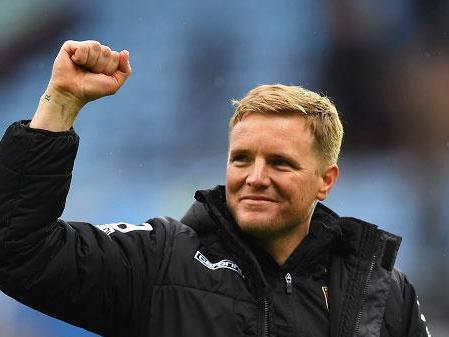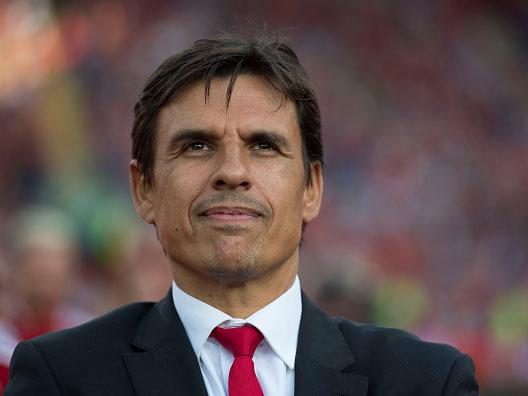Eddie Howe could be England's Joachim Low, says Danny Higginbotham
The problems in English football are too endemic for another veteran short-term coach. What England need is a young manager with time to implement his vision.

Your support helps us to tell the story
From reproductive rights to climate change to Big Tech, The Independent is on the ground when the story is developing. Whether it's investigating the financials of Elon Musk's pro-Trump PAC or producing our latest documentary, 'The A Word', which shines a light on the American women fighting for reproductive rights, we know how important it is to parse out the facts from the messaging.
At such a critical moment in US history, we need reporters on the ground. Your donation allows us to keep sending journalists to speak to both sides of the story.
The Independent is trusted by Americans across the entire political spectrum. And unlike many other quality news outlets, we choose not to lock Americans out of our reporting and analysis with paywalls. We believe quality journalism should be available to everyone, paid for by those who can afford it.
Your support makes all the difference.England may be close to appointing Sam Allardyce as their new manager but in doing so they are missing out on a rare opportunity to build for the future. Allardyce is experienced but he would be a short-term fix, which is precisely the problem. What we need is a long-term commitment from a young manager with a clear sense of identity about what he wants to build. We need our own Joachim Low. And I believe that man is Eddie Howe.
One of the many problems with English football is that we think that every new manager comes in with a magic wand to make all our problems go away. But the reality of the situation is that the last few England managers did nothing to fix our national game. Sven-Goran Eriksson, Steve McClaren, Fabio Capello and Roy Hodgson all ended up being brought down by the same endemic problems in English football. I fear that Allardyce, although a good manager, would not address our deeper issues. We need a younger man who will want to the job for a longer time.
Capello was 63 years old when he took over as England manager. Hodgson was 62. Allardyce is 61. I have nothing against Allardyce as a manager but he would not be inheriting a good structure only in need of some quick leadership. This is a long-term job, a 10-year job, and I cannot see him suiting that.
International football is about identity, a clear way of playing, and that takes time to develop. I know Germany were disappointed by their semi-final exit at Euro 2016 but they have been the most consistent team in the world recently. And that is thanks to the long-term planning of Low, who was 46 years old when he took over as manager and had been involved in the set-up before then. Low was not especially experienced as a manger when he took the Germany job. He had managed 210 matches at club level, and won one German Cup with Stuttgart and one Austrian league with Tirol Innsbruck.
Or look at Chris Coleman. He was 41 years old and had managed for 326 games before taking over as Wales manager, at Fulham, Real Sociedad and Coventry City and in Greece. The best thing he had won was Manager of the Month. And yet look how he has proved himself a top class manager with his historic achievements with Wales.
What this shows is that experience is not the be-all and end-all of international management. It is more about finding someone with a vision, enthusiasm, and the time to deliver it. Eddie Howe is still just 38 years old and has far more experience – 375 matches as manager – than Low or Coleman did when they took their jobs. And he has achieved more too, having dragged Bournemouth up to the top flight and kept them there.

That is why I think that he would be the right man, at the right age, to tackle the long-term problems in English football. Some younger managers would get bored in a role only working with players every few months. But there is so much root-and-branch reform needed in our national game that Howe would always have to be busy trying to impose his vision across the whole football structure.
What we need is a manager to build a strong sense of footballing identity in England again. That is something that we have lacked recently, no more so than at Euro 2016. We need to know how England teams are meant to play, not just at senior level but at under-21, under-19 and under-17 level too. For too long we have been desperate to imitate the French way, or the German way, or the Spanish way, or the Dutch way, ignoring the fact that every other country will be far ahead of us in their own race. We need to rediscover an English style.
Clearly Howe is a manager with a strong sense of how he wants the game to be played. One of the many things I admired about him at Bournemouth is how he stuck to his principles even in October and November last season when they looked like they were in trouble. Those same principles kept Bournemouth up.
Then, we need to know why the top English teams are not producing as many good players as they used to. Why did so many of the England side at Euro 2016 develop away from our top flight clubs? Joe Hart at Shrewsbury, Dele Alli at MK Dons, Eric Dier in Portugal, Chris Smalling at Maidstone, Kyle Walker at Sheffield United and so on. Clearly there is a problem with our academies, and the players they produce are not good enough. That is why when players get released from top flight academies they tend to drop into the Football League, rather than staying in the Premier League.
And we need to bring these two issues together by making sure that our national age-group sides are all playing in the same way, picking the best players available to them and gaining experience of playing – and winning – at international tournaments. Why is it that from the last three European Under-21 Championships, England teams have gone out at the group stage three times in a row, winning just one game out of nine?
Just look at the importance of the 2009 under-21 champions to the Germany side who won the 2014 World Cup. Or even the Portuguese runners up of the 2015 tournament, featuring William Carvalho, Raphael Guerreiro and Joao Mario, all part of last week’s Euro 2016 champions.
Yet English age-group sides never play in the same way as the senior team. They never pick the best players available to them. And we wonder why our teams freeze when they have to make the step up to senior tournaments. English football desperately needs some joined-up thinking, one man with a clear vision for the development of the English game. This is a long-term job which needs a young manager to do it. Or we will be in the same miserable position again in two or four years time.
Join our commenting forum
Join thought-provoking conversations, follow other Independent readers and see their replies
Comments